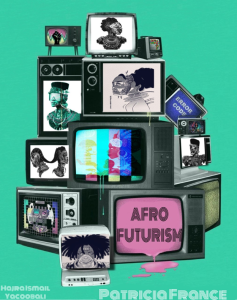[English] Afrofuturism Across the African Diaspora: Empowering Black Students Through Literature
Description of the Resource:
This textbook is student-centered and includes creative learning activities. The readings fit the purpose of giving students tools to see themselves in the text. Instructors are encouraged to build community building as they explore topics with students. The curriculum is centered on the African American and African Diaspora with opportunities to experiment to meet the needs of the students. Each reading and assignment will offer students a way to discuss modern topics and issues as a community and culture.
Faculty can use the textbook to introduce literary analysis and argument using the different activities. Each chapter includes an image centered on Afrofuturism. Each visual is an opportunity to engage students in art and Afrofuturism as a pre-activity to introduce fiction, short stories, and poetry. In addition, there are key points, suggested readings, and summaries of sample literary examples for faculty to use in the class for discussions. The readings are a sample based on themes for each chapter. However, this is an introduction to Afrofuturism. Faculty are encouraged to invite students to find their examples of Afrofuturism literature in their everyday lives.
How This Resource Integrates Diversity, Equity, and Inclusion Principles and Practices:
This textbook is inspired by Octavia Butler’s Parable of the Sower — the relatable topics of climate change, racial injustice, and inclusivity. In addition, the main character is a young woman of color who leads with purpose but is also flawed. The setting in California, specifically Northern California sparked my interest. During the pandemic, I taught a unit on Afrofuturism, which students embraced. My online class focused specifically on writers of diverse backgrounds, ethnicities, and gender. Parable of the Sower engaged the students in current topics still relevant in the book. However, the topics can apply to any part of the world. Students embrace the themes that connect with their own lives. This textbook is inspired by that connection and need for self-agency. Afrofuturism is that motivation.

